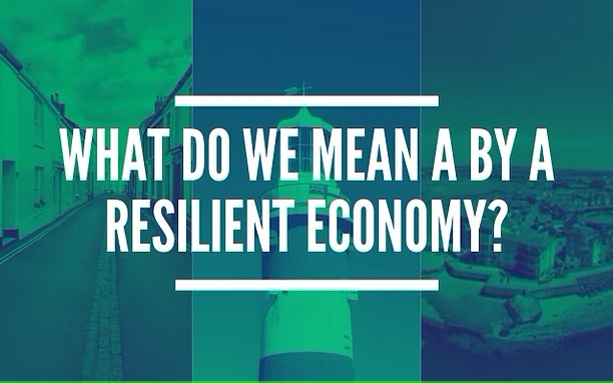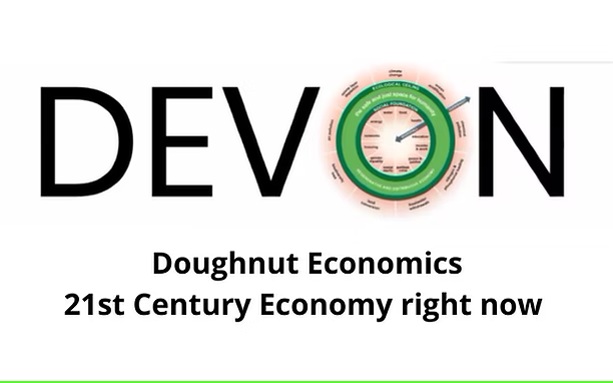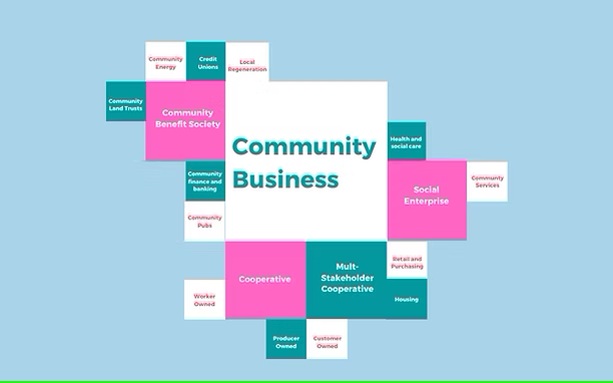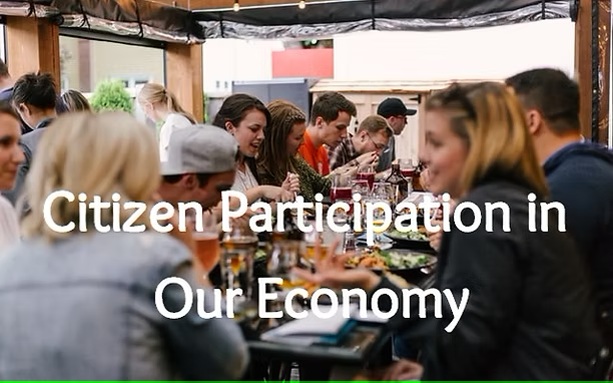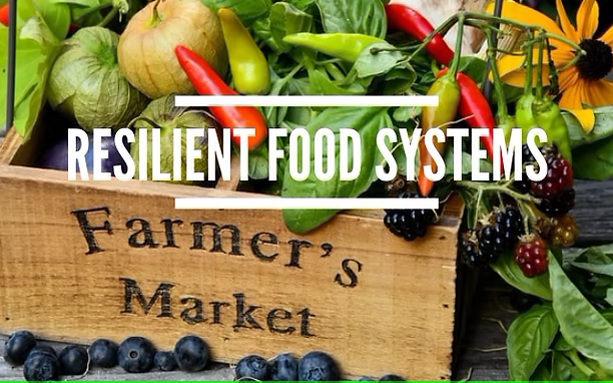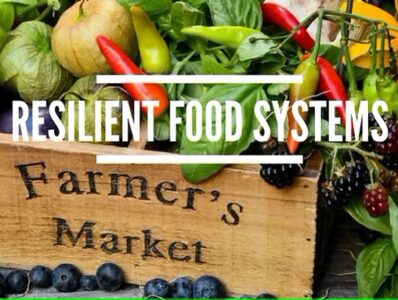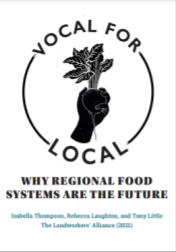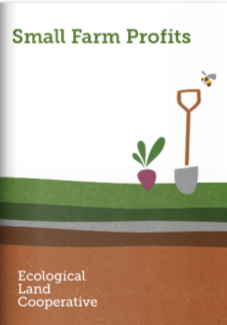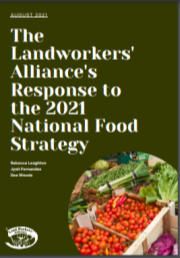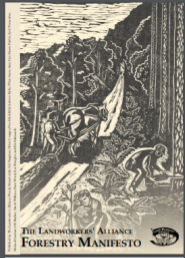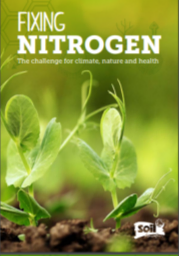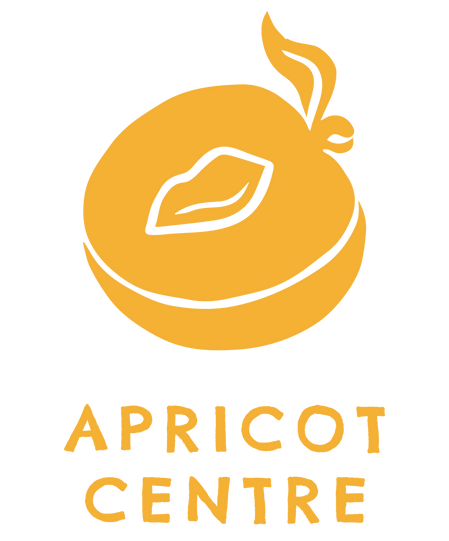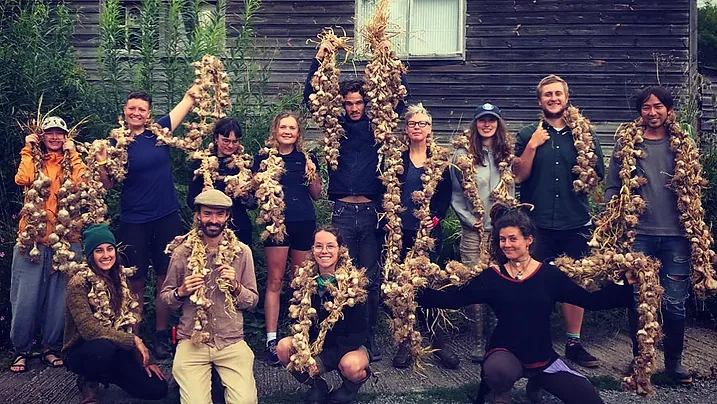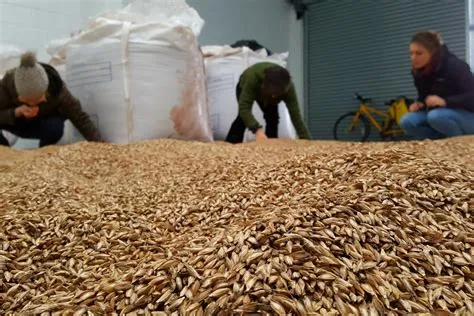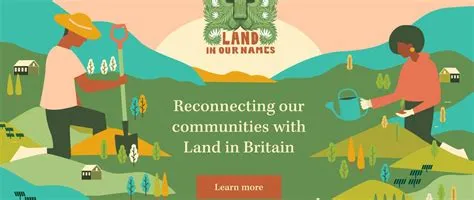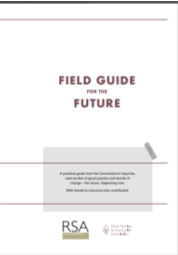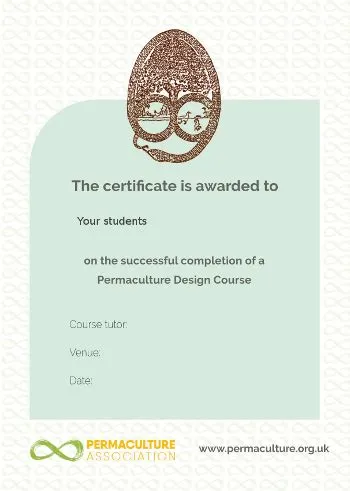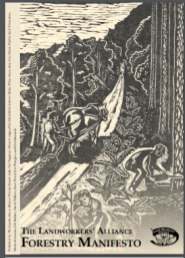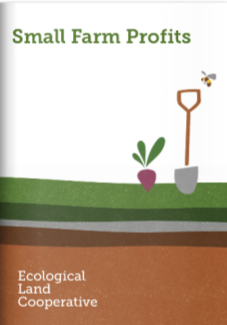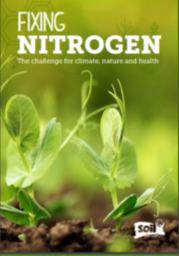A resilient food system is able to withstand and recover from disruptions in a way that means everyone has sufficient access to affordable, healthy and nutritious food. But to achieve true resilience we need to go beyond sustainability. We need to go beyond sustainability. Its crucial that as well as being able weather coming storms and multiple crisis our food system is part of a ‘regenerative’ economy. This means we need agriculture, enterprise, procurement and retail strategies that repairs and regenerates ecosystems and the soil, and economies.
This section contains resources from experts about ways to build a healthy and sustainable food system that ensures resilient and regenerative communities in Devon and beyond fit for the 21st century. These resources would suit farmers and food growers (including new entrants to farming!), policy makers, social enterprise leaders, local authorities, food retailers, food campaigners, community groups and individuals looking for ideas, inspiration and expertise to grow a new economy for Devon.
With the economic crisis pre and post lockdown, and with the climate crisis and biodiversity loss we are experiencing, along with access to land diminishing with land prices rising and how crucial access to healthy food is that this is a crucial addressing food resilience is a top priority.
The resources in this part of our knowledge hub have been split into two sections:
SECTION 1. What we need to do to build resilient food systems and why: research, policy and strategic partnerships and interventions
SECTION 2. How to create resilient food systems through enterprise, community and sustainability: inspiration support, how to guides, training, model enterprise examples and case studies for farmers, growers, and food retailers
SECTION 1.
What we need to do to build resilient food systems and why: research, policy and strategic partnerships and interventions

Food Exeter
Food Exeter exists to work with others in order to move towards a ‘food future’ for the city which fulfils the following five conditions.
- There is access to nutritious, healthy food for all
- Exeter has a thriving ‘food culture’
- There is a strong, resilient Exeter and Devon food economy
- A sustainable local food system
Exeter’s local food system is resilient and more secure
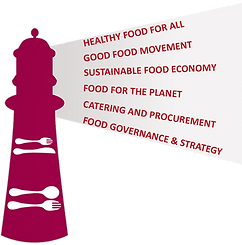
Food Plymouth
Food Plymouth is the City’s recognised Local Food Partnership
A ‘central connecting hub’ for all food-related matters in the City.
Our multi-sector award winning partnership, founded in 2010, comprises a diverse mix of agencies, organisations, businesses, community groups and individual citizens, all working together to actively promote and lobby for healthy, sustainable and affordable food as a driver for positive change.
Video (1 hour)
Recording of the Food, Land & Sea Webinar hosted by Devon Climate Emergency for the Interim Devon Carbon Plan. With thanks to members of the Net-Zero Task Force Sue Goodfellow, Lyndis Cole and Gill Westcott and guest speakers Sue Quicke of Quicke’s Cheeses and Paul Cottington from the NFU.
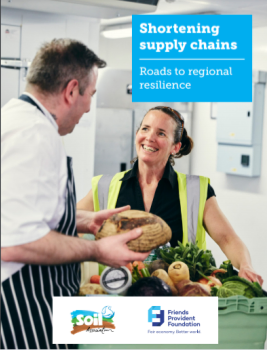
Shortening Supply Chains
Shortening supply chains: Roads to regional resilience. Soil Association report.
There is a significant role for the public sector to play in growing the regional and sustainable food sector. Sourcing food from this sector will contribute to climate change mitigation in supply chains, and also bolster local economic resilience.
Video (40 mins)
RegenerateDevon
This session showcase’s enterprises who have put ecological regeneration at the core of their work, from the sectors of energy, housing, transport, neighbourhoods and farming.
Speakers:
Host – Emily Reed – Devon Emergency – Devon County Council
Ayesha Tandon – Climate Science Communicator – Met Office
Alistair Macpherson – CEO – Plymouth Energy Community
Mark Hodgson – Managing Director – Co-Cars
Marina O’Connell- Director- Apricot Centre & Huxhams Cross Farm
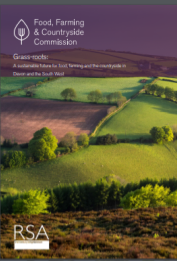
Devon Sustainable Food & Farming report
Grass-roots: a sustainable future for food, farming and the countryside in Devon and the South West is the final report from Food Farming and Countryside Commissions first phase of our Devon inquiry.
A group of expert stakeholders was convened within the region, whose expertise and experience span farming, agriculture, conservation, health, and policy. Together, the group decided to focus on four key areas, with each working group publishing individual reports.
Video (1 hour 30 mins)
“Join LION as we host a presentation and panel discussion to share our research on the experiences of Black people’s and people of colour’s experiences of growing food for social enterprise and sustaining livelihoods. During this webinar, we will be sharing our key findings from this research and offering our recommendations based on further discussions with our project partners and relevant stakeholders.”
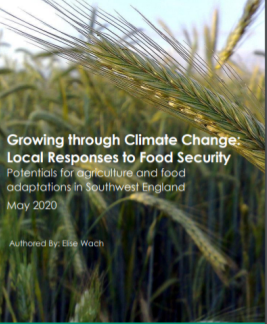
Growing Through Climate report
Growing through Climate Change: Local Responses to Food Security
Potentials for agriculture and food adaptations in Southwest England.This report is targeted for horticultural and arable food producers of various scales and for community groups in the Southwest of England who wish to work towards greater food security in the context of our changing climate. While animal farming could fit into a model of sustainable food production, due to the scope of this report it is not covered here in detail
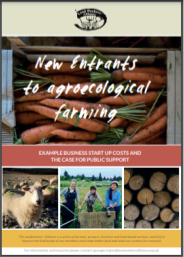
New Entrants to agroecological farming
The primary objective of compiling these estimated cost examples is to show that new entrants to agriculture and forestry face significantly higher start up costs than new entrants to other sectors of industry. While it is entirely possible to generate decent but modest livelihoods working in this sector, profit margins are both slim and extremely variable, and new entrants often do not have property to secure loans against.

Growing Devon Schools
The partnership exists to support teachers, parents, and community volunteers in the development and delivery of outdoor experiential learning that builds skills, environmental awareness, a lifelong healthy relationship with food and an understanding of its production and preparation.
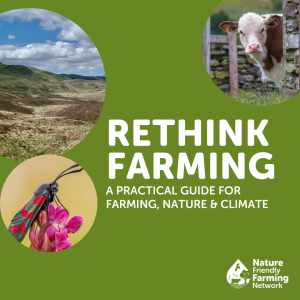
Rethink Farming
From the Nature Friendly Farming Network: Rethink Farming – A Practical Guide for Farming, Nature & Climate brings together resources on key areas of climate concern and highlights the golden opportunities within farming and land use management, including soil, water, biodiversity, carbon management, landscape approaches and food quality.
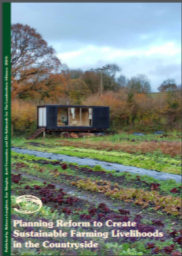
Planning Reform Sustainable Farming
Planning Reform to Create Sustainable Farming Livelihoods in the Countryside. By the Land Workers Alliance Union.
The growth of agroecological farming in England is currently significantly hampered by the planning system. This report sets out proposals and case studies for planning reform.
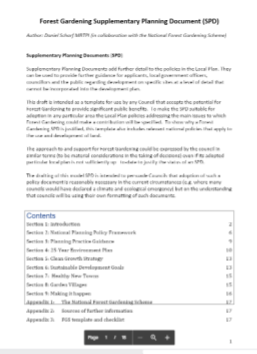
Forest Gardening Supplementary Planning Document
Supplementary Planning Documents add further detail to the policies in the Local Plan. They can be used to provide further guidance for applicants, local government officers, councillors and the public regarding development on specific sites at a level of detail that cannot be incorporated into the development plan.
This draft is intended as a template for use by any Council that accepts the potential for
Forest Gardening to provide significant public benefits.
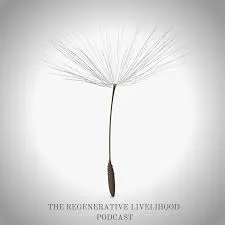
Podcast (1 hour)
Regenerative Livelihoods podcast, Finn Weddle interviews Oliver Bettany, Membership & Engagement Manager at the Ecological Land Co-operative- a community benefit society that matches agro-ecological farmers with land, their first site Greenham Reach in Mid Devon has been a huge success.
Podcast (35 mins)
Rob Hopkins From What If To What Next podcast. In today’s episode we bring together Josina Calliste, a health professional and community organiser who is one of the co-founders of Land in Our Names (LION), a black-led collective addressing land inequalities affecting black people and people of colour’s ability to farm and grow food in Britain, and Chris Smaje, author of the book ‘A Small Farm Future’ and the brilliant blog of the same name.
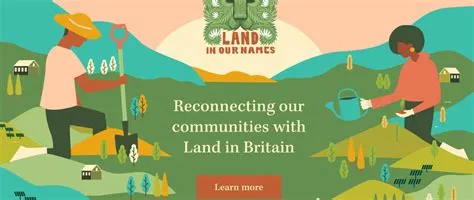
LION- Land In Our Names
“We share the stories of Black landworkers and landworkers of colour. We create opportunities for Black and people of colour (BPOC) to connect on the land, with nature and with each other. We hold workshops and events to strategise and network-build. We work to change the narrative around land and race, seeking to empower BPOC in issues around the environment, climate and sustainability.”
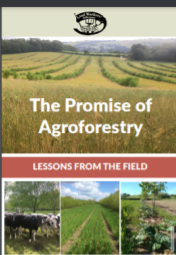
The Promise of Agroforestry
It is a report for farmers, policy makers and all those who care about our land use, our environment and our food systems. Much of the information here is practical, but practice needs political support when we are trying to establish new and diverse activities. The section for policy makers can be found on page 21.
Podcast (40 mins)
Rob Hopkins From What If To What Next? Podcast with special guests Dee Woods and Christian Jonet “What If towns and cities set out to intentionally relocalise their food production?” How would it work? Where would you start? How would you involve the local government? How would you ensure that it is inclusive?
Podcast (30 mins)
Recorded for the Oxford Real Farming Conference “We hear from Josina Calliste, co-founder of Land in Our Names (LION), who shares about her visit to Leah’s Soul Fire Farm and their collaboration on a conversation around food justice, land justice and re-connecting with nature at the conference.”
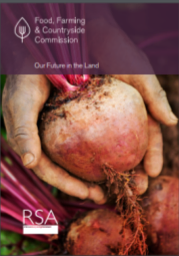
Our Future in the Land report
In this final report from the Food Farming and Countryside Commission, it sets out radical and practical ways for policymakers, business and communities to respond to the challenges.
The report makes fifteen recommendations in three areas:
- Healthy food is everybody’s business
- Farming is a force for change, unleashing a fourth agricultural revolution driven by public values
- A countryside that works for all, and rural communities are a powerhouse for a fair and green economy
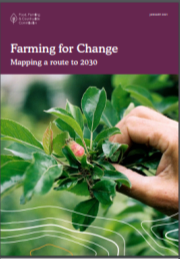
Farming for Change report
Farming for Change: mapping a route to 2030 introduces new research from research institute, IDDRI, showing agroecology can produce enough healthy food for a future UK population and explores how this new technical modelling challenges and develops our thinking about a new food and farming system.
Video (1 hour)
In this session with Land in our Names and Shared Assets, we’ll explore the relationship between land and race in the UK. In particular, it will focus on how colonialism, displacement, and migration have shaped our land system, and how those histories impact on land access, ownership, food inequalities, health outcomes, and environmental connection, and what needs to change in the land system to help deliver racial justice.
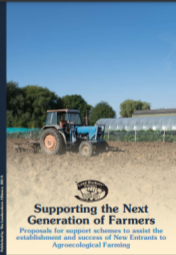
New Entrants Farming Proposals
The Landworkers’ Alliance are proposing a support package aimed at increasing the number of new entrants to agroecological farming by targeting government support at the three core issues facing new entrants: access to land, the start up costs of establishing a business and the lack of appropriate on-farm training.
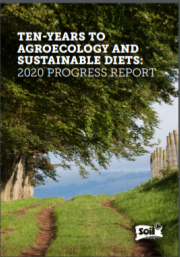
Agroecology and Sustainable Diets report
This Soil Association 2020 report tracks progress in the transition to agroecology and sustainable diets. It looks back over the key events of the past year, and ahead to the next 12 months – assessing the key challenges and highlighting the opportunities that will help secure a better future.
Video (1 hour 30 mins)
Dismantling systemic racism is central to the work of creating healthy, just food and farming systems for all. From the days of the colonial empire to the current industrial food system – so much of our food is produced with the sweat and blood of unpaid or vastly undervalued labour. The links between racial justice and food justice are very clear.
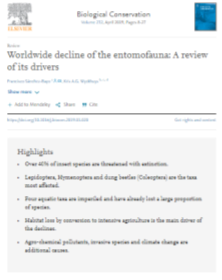
Global Insect Decline report
Biodiversity of insects is threatened worldwide. Here, we present a comprehensive review of 73 historical reports of insect declines from across the globe, and systematically assess the underlying drivers. More than 40% of insect species are declining and a third are endangered, the analysis found. The rate of extinction is eight times faster than that of mammals, birds and reptiles.
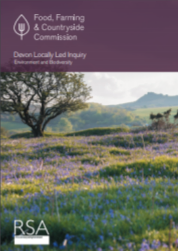
Environment & Biodiversity report
This report summarises the group’s work. It is informed by a roundtable discussion and a series of interviews held with farmers, landowners and conservationists (not mutually exclusive categories) in Devon.
Given the urgency of the issues discussed the group have opted to make recommendations which emphasise the pressing need to act.
The group chose to concentrate on three key themes:
- Climate breakdown (mitigation and adaptation)
- Biodiversity loss
- Access to advice
This report is one of four.
Podcast (30 mins)
“We hear Leah Penniman and Ọlá Ayòrindé in conversation about land injustices and repairing colonial trauma through relationship with the land. Leah is the co-founder of Soul Fire Farm in New York, and Ọlá is the co-founder of Land In Our Names (LION), an organisation addressing land injustices in the UK, and seeking to reimagine a system where people of colour can live off the land in ways which care for the soil, the surrounding biodiversity and themselves.”
Video (11 mins)
RegenerateDevon showcase: Amazing employers for meaningful livelihoods | Charlotte Tickle | Riverfood Organic Veg
Charlotte Tickle is the People and Culture Director of Riverford Organic Vegetables, an ethically-driven business with the aim to be an outstanding place to work. In 2018 it 74% of Riverford became owned by an Employee Trust, benefiting all employees equally.
SECTION 2.
How to create resilient food systems through enterprise, community and sustainability: inspiration, support, how to guides, training, model enterprise examples and case studies for farmers, growers and food retailers
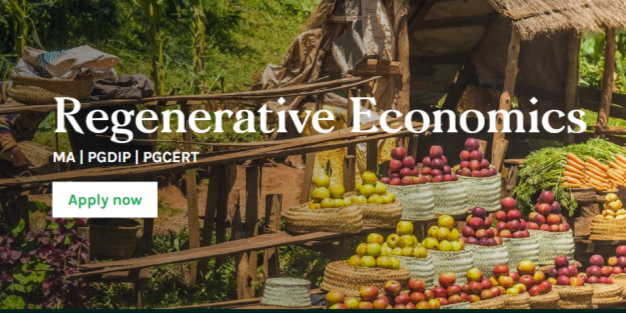
Degree Programmes
Higher Education: Regenerative Economics
MA | PGDIP | PGCERT This course is at the forefront of new economic thinking, drawing upon diverse disciplines including psychology, anthropology and living system design
Gain a refined understanding of economics, together with tools, methodologies and communication skills to incorporate into your future career
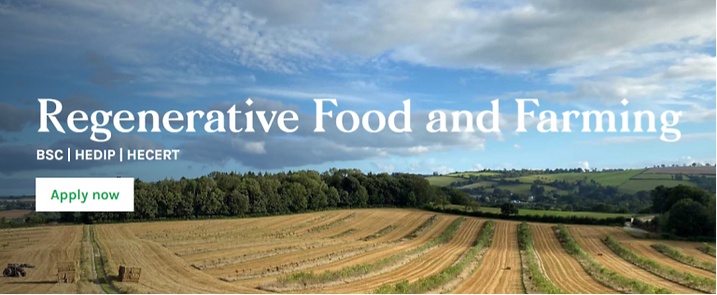
Degree Programmes
Higher Education: Regenerative Food and Farming BSC | HEDIP | HECERT
- Explore leading-edge alternatives to mainstream agricultural practices and food systems
- Draw from Dartington’s pioneering work in the field of agroforestry
- Grapple with the challenge of how we can build a thriving and resilient food and farming sector.
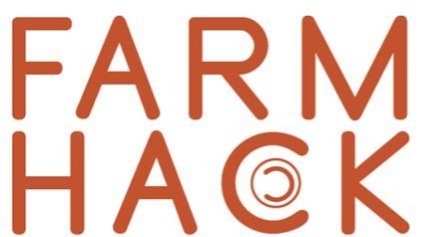
FarmHack
FarmHack is a forum for farmers and growers developing appropriate tools for small scale agroecological farming to share their ideas and skills. FarmHack events bring together farmers, growers, fabricators, engineers and IT programmers to demonstrate and share tools, skills and ideas.
FarmHack operates on the principles of open source technology meaning that tools and techniques are also shared and developed on the international online forum.

Good Food Exeter
Good Food Exeter is a not-for-profit social enterprise, set up to:
- Help local businesses that produce quality local food, with care for the environment and animal welfare, to find more local customers
- Give producers a fair price for their produce, helping create and sustain livelihoods in sustainable food production
- Create links between producers and groups working to improve access to healthy, sustainable food.
Video (1 hour 30 mins)
Setting up and running cooperative sales & purchasing models for farmers- Webinar from Landworkers Alliance union about multi-stakeholder food cooperatives with inspiring case studies with Helen Woodcock of the Kindling Trust about Manchester Veg People and Danny Fisher of the Better Food Shed London
How can different farms work together to run cooperative sales / purchasing systems?
What are the benefits of these systems?
How can we make them sustainable?
How can we make them successful?
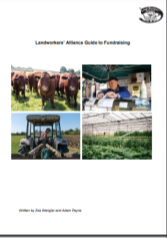
Fundraising for Landworkers
As part of the Landworkers Alliance work to remedy this situation (of underfunding in the industry) they have produced this guide and offer support and advice to their members on finance and fundraising. They hope it is of use and welcome feedback, input, new ideas and new content.
Incredible Edible story & tips
‘The Power of Small Actions’: The world renowned Incredible Edible Todmorden share their story in ‘The Power of Small Actions’ presentation for Sustainable Crediton. It may also help inspire neighbouring community focused groups and beyond! Incredible edible is a brilliant example of the ‘gift economy’ and inclusive community- led action that benefits health and wellbeing of local people whilst creating community assets.
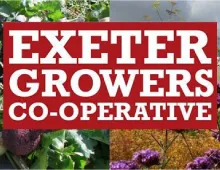
Exeter Growers Co-op
Exeter Growers Co-operative rents 4 acres of organic land on the SW edge of Exeter, near Shillingford. The Co-operative strives to promote understanding, enjoyment and sustainable use of the land, especially through organic food production. All production is to Soil Association organic standards
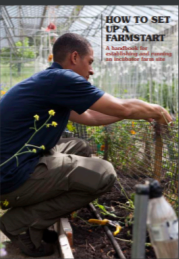
How to set up a farmstart
This guide is aimed at people and organisations who want to set up Farmstarts, or farm incubation sites. With it we aim to provide a set of best practice guidelines, based on the experiences of established organisations.
Alongside this handbook we are establishing a network of Farmstart organisations that can share experiences and support one another in the spirit of mutual aid and solidarity.
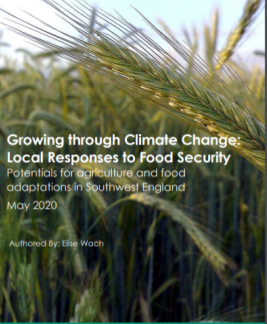
Growing Through Climate
Growing through Climate Change: Local Responses to Food Security
Potentials for agriculture and food adaptations in Southwest England.This report is targeted for horticultural and arable food producers of various scales and for community groups in the Southwest of England who wish to work towards greater food security in the context of our changing climate. While animal farming could fit into a model of sustainable food production, due to the scope of this report it is not covered here in detail
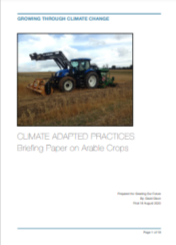
Climate Adapted Arable Crops
This briefing paper explores how arable farmers in South West England can adapt to climate change, especially by evolving cultivation methods and crop choices. It draws on material from a longer research report produced by Elise Wach entitled Growing Through Climate Change.
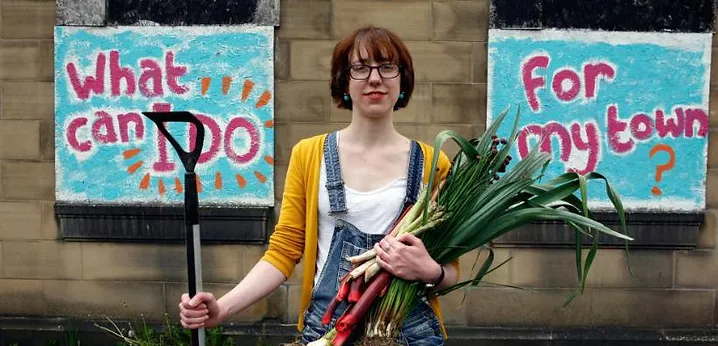
Incredible Edible Network
Find your local group or set one up. The Incredible Edible Network provides a range of support:
- Get going with lots of information if you’d like to start a group.
- Our Catalyst Partner programme, for you if you’re from an organisation and interested in how Incredible Edible could work in your communities.
- Our Growing Leaders course, for you if you’re already involved in an Incredible Edible group and would like to expand your skills.
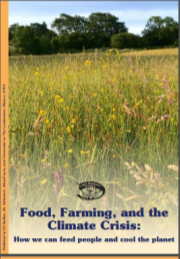
Food, Farming and Climate Crisis
- The Impact of our Food System on the Climate
- Redefining Our Food System
- Climate Justice in our Food and Trade Policy
- Systemically Addressing the Climate Emergency
- Maintaining a Global Perspective
- Reducing Emissions Related to the Wider Food System
- Reducing Direct Emissions From Production
- Increasing Carbon Sequestration
- Improve Farm Adaptation by Maximising Resilience
- Avoiding Climate Policy Distortions
- For Inclusion in Policy
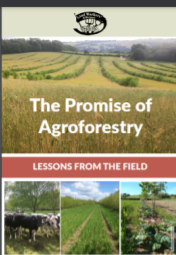
Agroforestry Lessons from the Field
This report looks closely at eight established and working examples of these new forms of agroforestry in the UK, and explores what we can learn from them. Prior to that it looks at the related issues of carbon and climate because they are so integral to which direction land use takes over the next few decades.
It is a report for farmers, policy makers and all those who care about our land use, our environment and our food systems.
Innovative Farmers
Innovative Farmers matches farmers with researchers so they can codesign practical but robust on farm trials. This video explains about how the network works and how you could set up your own farmer led research.

Agroecology and Sustainable Diets report
This Soil Association 2020 report tracks progress in the transition to agroecology and sustainable diets. It looks back over the key events of the past year, and ahead to the next 12 months – assessing the key challenges and highlighting the opportunities that will help secure a better future.

Food Plymouth
Food Plymouth is the City’s recognised Local Food Partnership
A ‘central connecting hub’ for all food-related matters in the City.
Our multi-sector award winning partnership, founded in 2010, comprises a diverse mix of agencies, organisations, businesses, community groups and individual citizens, all working together to actively promote and lobby for healthy, sustainable and affordable food as a driver for positive change.

Food Exeter
Food Exeter exists to work with others in order to move towards a ‘food future’ for the city which fulfils the following five conditions.
- There is access to nutritious, healthy food for all
- Exeter has a thriving ‘food culture’
- There is a strong, resilient Exeter and Devon food economy
- A sustainable local food system
Exeter’s local food system is resilient and more secure
Video (1 hour)
Recording of the Food, Land & Sea Webinar hosted by Devon Climate Emergency for the Interim Devon Carbon Plan. With thanks to members of the Net-Zero Task Force Sue Goodfellow, Lyndis Cole and Gill Westcott and guest speakers Sue Quicke of Quicke’s cheeses and Paul Cottington from the NFU.
Video (40 mins)
RegenerateDevon
This session showcase’s enterprises who have put ecological regeneration at the core of their work, from the sectors of energy, housing, transport, neighbourhoods and farming.
Speakers:
Host – Emily Reed – Devon Emergency – Devon County Council
Ayesha Tandon – Climate Science Communicator – MET Office
Alistair Macpherson – CEO – Plymouth Energy Community
Mark Hodgson – Managing Director – Co-Cars
Marina O’Connell- Director- Apricot Centre & Huxhams Cross Farm
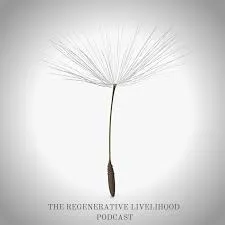
Podcast (1 hour)
Regenerative Livelihoods podcast, Finn Weddle interviews Oliver Bettany, Membership & Engagement Manager at the Ecological Land Co-operative- a community benefit society that matches agro-ecological farmers with land, their first site Greenham Reach in Mid Devon has been a huge success.
Video (11 mins)
RegenerateDevon showcase: Amazing employers for meaningful livelihoods | Charlotte Tickle | Riverfood Organic Veg
Charlotte Tickle is the People and Culture Director of Riverford Organic Vegetables, an ethically-driven business with the aim to be an outstanding place to work. In 2018 it 74% of Riverford became owned by an Employee Trust, benefiting all employees equally.
Knowledge Hub
There is much more to discover in the Knowledge Hub.
